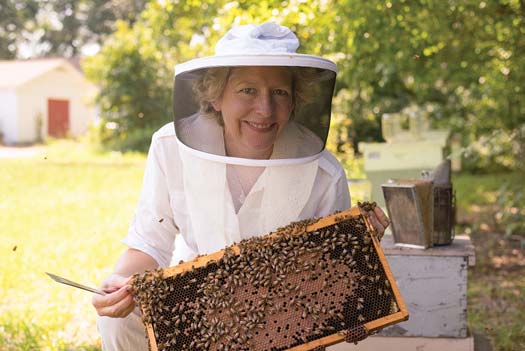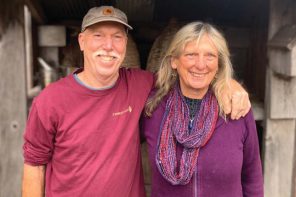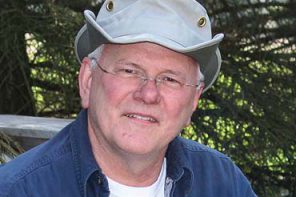By: Dewey Caron
Do y’all know Jennifer Berry, Research Professional and Lab Manger for the UGA Honey Bee Program? She has been a frequent contributor (80+times and counting) to Bee Culture or maybe she’s spoken at your bee program. Since her start in the bee arena 20 years ago, she has travelled to meetings in over 25 states, and eight countries. Since 2014, she has interviewed a broad mix of interesting individuals for the December Interview feature (and be sure to read her contribution for this year). This year it is my privilege and honor to turn the tables and interview Jennifer.
Part I: Lets start at the beginning. Jen grew up “all over” as the only child of an Air Force father. For stability, she spent her Summer months frolicking about at her grandparent’s farm, located outside of Holden, Missouri. Some of her fondest memories were from those times on the farm. Her first bee encounter happened there as well. One day, her grandfather and she visited an old oak tree down from the horse barn. Her grandfather jumped out of the truck, grabbed a sharp knife out of the toolbox and without protection, reached into a large hole in the tree, removing some honey-filled comb just for her. Jen remembers it was the most delicious thing she had ever tasted, once they brushed the bees away. They would return to “harvest” that tree for years to come.
Jen attended high School in Florida and was involved in the thespian club. Following graduation, she moved to San Antonio, TX to be closer to her dad, who by then had retired from active military service. Since Jen was a little girl her dad wanted her to attend Texas A&M, where he, years prior, had obtained his Master’s degree in computer science. Jen started at A&M as a Biomedical Engineering major but that didn’t last long. If you know Jen, I bet that was something you didn’t know?
That fateful day: After class one day, Jen vividly remembers walking by and then entering the theater building. Creeping down the hallway, she heard the familiar sound of theatrical voices. She timidly decided to peer in the window and see a group acting out a scene from Shakespeare’s Macbeth. She was captivated and eventually worked up the nerve to enroll in the next acting class. One week into the class she knew engineering was not for her, she wanted to be an actress. Only problem, how was she going to explain switching majors to her dad; engineering to theatre. With Jen as his only child, and “being the most patient man on the planet,” as Jen remembers him, he graciously (after a couple of big gulps) accepted and supported her decision.
The theatre program at A&M was not large but was an intimate one built around two dynamic professors and acting coaches, Dr. Sodders and Dr. Maryann Mitchell. For several years the theatre majors travelled to see productions as well as putting on numerous plays on and off campus. These were good and taught Jen a whole lot about acting.
If you have ever had the pleasure to hear Jennifer give a bee talk you know in addition to solid bee content, she will include a personal (often very funny) story in her talk, one that grabs your attention, largely for her telling. During my interview, she had me laughing as she related her birdseed-filled bra story – stop me if you have already heard it!
Birdseed bra? It seems one of the A&M stage productions, Getting Out by Marsha Norman, called for a very busty female part that Jennifer was to fill. The director insisted that she appear as very well endowed. The props people tried several materials to enhance Jennifer’s bust line, but to no avail, the director remained unsatisfied. She wanted it to look more, “natural and bouncy.” That’s when it was suggested to fill a very large cupped bra with birdseed. So this special birdseed-filled bra was custom-made for Jennifer. It was perfect – well sorta – until . . .
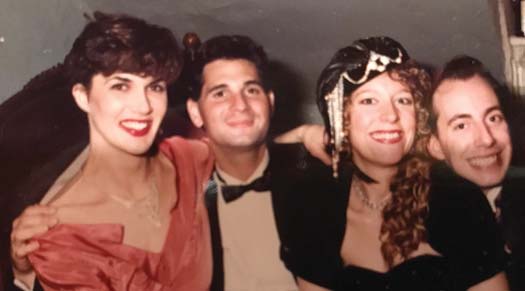
Jen after a show.
Opening night. As she entered the stage, Jen heard this ping, ping, ping. At first Jen was confused by the sound but then realized it was birdseed hitting the floor. Her bra, on the left side, had sprung a leak! By the time the scene was over, one side had completely deflated. And to make matters worse, the rest of the play had to be performed while walking/sliding on birdseed scattered across the entire stage. By the next day, virtually everyone on campus, everyone in College Station, maybe everyone in Texas, had heard about the deflating birdseed bra. She got many comments about her performance, “One minute Dolly Parton, the next” – “Alfred Hitchcock’s Birds would have appreciated this performance” – Comments one an aspiring actress was not really hoping for. Here birdie, birdie, here birdie, birdie!
After that fateful performance, she visited a comedy club in Chicago; she was immediately mesmerized by the improv group entertaining the crowd. Feeling more suited to comedy than pursuing a serious acting career, she left A&M and set out to be a comedian. She had to tell her dad first, who once again, “head in hands, accepted and supported my decision.” There were a few side trips in order to fund her comedic path, one was picking apples in Washington state and living in a cabin, miles from anyone, with no electricity, running water or indoor plumbing but plenty of apples to eat. The perfect way to save money!
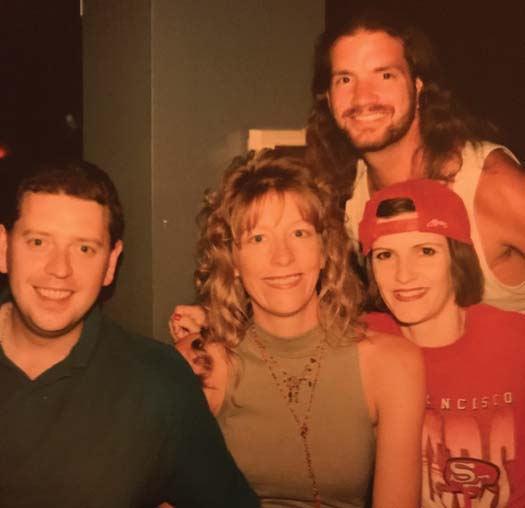
Jen in LA with fellow comedians.
After the orchards of Washington, and a few plays in Austin, Texas, Jen landed in Columbus Ohio to work with an improv troupe called The Outpatients…Committed to Comedy. Jen worked with three fellows who were extremely talented. The troupe travelled to college campuses and did gigs in comedy clubs around the U.S. Initially pay might be nothing more than a free drink, or a basket of French fries, but eventually there was money to be made. Together, they decided to go to Hollywood where they could be “discovered.” At the last minute the three backed out. So, alone, Jennifer set out to follow her dream.
Off to Hollywood – next the big break: To support her meager comedian income, she did a number of day jobs, bartender and waitress, (yes the classic – every L.A. bartender/waitress is a star waiting to be discovered). She washed cars, walked dogs, wrapped presents and made fancy baskets at a Christmas store. She dealt blackjack, was an assistant to the superintendant in her apartment building, anything by day so she could improve her comedy by night in pursuit of the dream!
What would be her best booking ever came at The Improv on Melrose Avenue in West Hollywood. She was booked to go on at the coveted 9PM Thursday night slot. For months, she rehearsed her set with friends, in smaller comedy clubs, in front of the mirror, in the shower, because she needed her 20 minute routine to be perfect. Then, that night, around 8:30PM, there was a last minute change, a substitution. Jerry Seinfeld happened to stop by and asked if he could jump on stage for a few minutes. No one was about to tell Jerry Seinfeld “no” since he was the hottest comedian with the number one rated TV show at the time. Bud Freeman, owner, came into the greenroom to tell Jen that she would go on after Jerry. As he walked out, the rest of the comedians in the room said, almost in unison, you are screwed! No one can follow Jerry Seinfeld. Well, as it went down, Jerry stayed on stage for over an hour and Jennifer’s booking was re-scheduled for the 7PM slot the next Monday, not an ideal booking night or time. Her 20 minutes at The Improv were not the dream she was following.
Then a few weeks later as luck would have it, Jen was having a late night dinner with a friend. The waitress, well into her fifty’s, said she too was in L.A. to become a comedian and she was waiting – at any moment, her break would happen. Jen said that’s when it hit her “Would this be me in 20+ years” still waiting for “the break”? Although happy doing comedy and hanging out with great fellow comedians in LA, Jennifer began to seriously question her professional ambitions. Then, there were a few more persuasive things like an earthquake, fires and floods, the usual stuff for Southern Californians, that helped to convince her, maybe it was time to leave LA.
Jen discovers bees
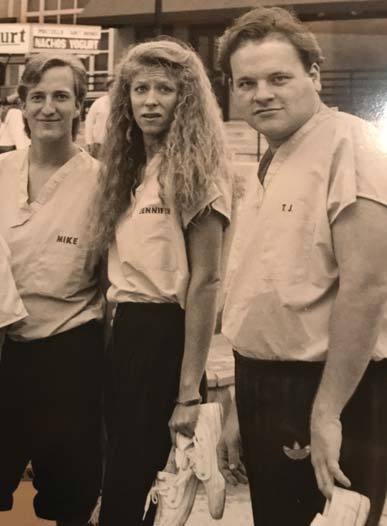
Jen with her ‘Outpatients’ Improv Troupe.
Start Part II: After leaving LA, Jen moved to her grandparent’s farm since she had always considered the farm her home. She enrolled in Central Missouri State College, in Warrensburg, MO. To gain credits in science, she took an entomology course – and loved it. She confessed to always be an “outddorsy” type of youngster growing up and always loving bugs. One day, in a discussion with her botany professor, she was encouraged to investigate the University of Georgia for entomology. The professor knew first-hand what a great instructional program UGA had since she was a PhD graduate of UGA.
Transferring to UGA a year later, Jen took a bees and beekeeping course offered by Dr. Keith Delaplane. In her own words “the clouds parted, the angels sang, the trumpets sounded” by the second class. She knew then a whole different chapter in her life was about to happen. In 1998, she finished her undergraduate degree and then became Keith’s first Graduate student. After graduation, Jen took the job as Research Coordinator and Lab Manager of the University of Georgia’s Honey Bee Lab.
Extension: Over the years, Jen has found a comfortable niche as an extension professional. She stands out in the world of apiculture not only for the depth and breadth of her outreach efforts but additionally for her grace and passion of her commitment. Initially, Jen performed extension activity within Georgia, working to advise beekeepers and 4-Hers; such efforts continue to the present. She soon found herself accepting invitations to teach in other states and countries.
In 2015, Jen teamed with then Georgia Beekeepers Association President, Bear Kelly, (whom she interviewed for Bee Culture in 2016) to create the Georgia Prison Beekeeping Program. The program aims to teach beekeeping to Georgia inmates along with helping them prepare for the University of Georgia’s Honey Bee Program, Georgia Master Beekeeper exam. Bear acknowledges that Jen was really the person who got this program off the ground. To date over 130 individuals have become certified beekeepers through the program with five completing the Journeyman level and two becoming Master Beekeepers. The program promises more to come.
Young Harris Beekeeping Institute: Each year, the UGA Bee Lab puts on the Young Harris Beekeeping Institute, which brings together dozens of local, national and international experts. Ann Harman, a long-time contributor to Bee Culture who passed away this past May, was an invitee to the 2002 Young Harris Institute event. She subsequently invited Jen to give short course talks for the 2003 Eastern Apicultural Society program at Bowdoin College in Maine. Well everyone loved her, loved her stories and her remarks. This was the start of Jen’s speaking career, which she has always been thankful to Ann for making it happen.
Since then, she’s hardly missed an EAS, been invited to HAS and WAS, and to date, has given over 500 lectures to local, state, national and international audiences. In 2006, she hosted the EAS at Young Harris, as President, the first one held in Georgia. I had the pleasure to nominate her and then congratulate her for the EAS 2019 Roger A. Morse teaching, extension and regulatory award. Jen was only the second female to be so recognized.
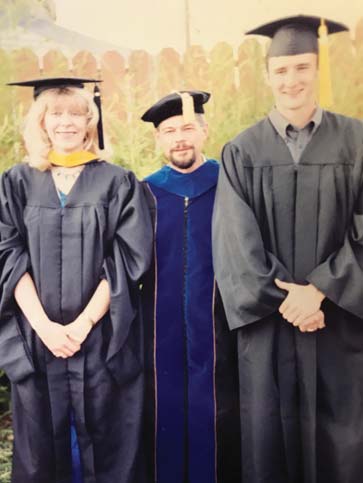
Jen’s MS graduation.
Overseas work: Jennifer has gone beyond Georgia with her extension and research work. In our interview, she was enthusiastic about a recent trip to Guatemala. She teamed up with entomologist Dr. Gwen Keller, USDA APHIS, and Jorge Ibarra, Director of the Apicultural Technology Transfer Center who are both instrumental in the MOSCAMED program. MOSCAMED’s mission is “the maintenance of a sterile medfly barrier north of Chiapas, Mexico, and to gradually extend the barrier further into Guatemala, designed to keep the pest from infesting the United States.”
The team visited coffee and beekeeper cooperatives to solicit their support of MOSCAMED. Earlier efforts in the fly control program used the insecticide Malathion that had a negative impact on honey bees and the surrounding environment. The current insecticide used to control the flies is non-toxic to bees or the environment. The program is seeking to restore the trust of beekeepers and coffee growers, so they can become cooperators in controlling medflies. Jen’s role was to offer research assistance, along with organizing future beekeeping and queen rearing classes.
Jen has had other overseas visitations. She was in Bolivia on a Farmer-to-Farmer assignment in 2002. I go every year to Bolivia, and I can tell you the beekeepers still ask me how Jen is doing. Jen has been instrumental in helping UGA Bee Lab graduate students complete their field studies. One such student was Nabor Hector Mendizabal. Nabor, notably the most knowledgeable beekeeper in Bolivia, is quick to acknowledge that without Jen, he would never have completed his degree. In other trips, Jen has also worked with the Exuma Foundation to teach beekeeping and queen rearing on Exuma Island, Bahamas. Additionally, she has taught women and young teens beekeeping and queen rearing in several regions throughout Nicaragua, one of her toughest three-week assignments.
Down on the farm: In 2006, Jen started her own queen and nuc business, Honey Pond Farm. She journeyed to Brushy Mountain in Moravian Falls, NC, where Steve and Sandy Forrest sold her enough equipment for 100 hives. The bees came from Bob Binnie, Blue Ridge Honey company. The initial 15 colonies quickly became 50 colonies, then became 100, and 100 became 200 and so on. Y’all know that drill. Nights and weekends, Jen and her husband Mark Davis, devote their time to caring for their bees after full days of work with UGA bees. As she puts it, it’s all about the bees; as you might expect, knowing Jen, they stress quality not quantity when it comes to their queens and nucs.
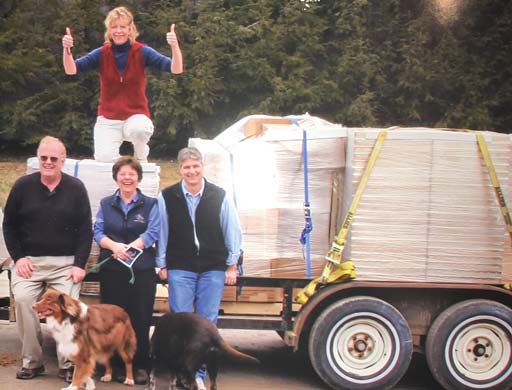
Jen at Brushy Mountain.
After 20 years at the bee lab, Jen has started a whole new effort; a PhD program. It was a commitment to her dad before he passed away last year. The program involves having three publishable papers, so, Jen is weaving a study on Oxalic acid (collaborating with Dr. Geoff Williams at Auburn University), a bee habitat restoration project with Department chair, Dr. S. Kris Braman, her supervising professor, and a third project with Crop and Soil Scientist, Dr. Nick Basinger. Needing to find time to work on the PhD, Jen has decided to downsize their own apiary and teaching at the farm. However, she is continuing to make the farm property more bee and pollinator friendly.
One more story: During my conversation with Jen she confessed to being fooled twice by an old gag. Before she was “into bees”, while still a struggling actress, she along with her theatre group, had the honor of hosting the famous comedian and actor Leslie Nielsen. After his final performance of the week, Leslie was invited to a party in which he would be fed homemade tamales and scotch, (weird? But Jen said that is what he wanted). As she and her friends were sitting around the kitchen asking Mr. Nielsen a myriad of questions, an unusual sound erupted from beneath him. Nobody said a word since it was obvious to all what the “noise” was; Leslie seemed not to notice. As hostess, Jen was unsure what to do.
After a few seconds of uncomfortable silence, someone fumbled about asking an additional question. Then another, much louder noise filled the room as Leslie proceeded to answer. “Were the tamales upsetting his stomach, or was the scotch not settling well with him? Jen thought”. This “noise” was unmistakably “toots” which continued for at least five minutes. The room was becoming quieter and quieter and the toots were becoming louder and louder. Just as Jen and the others were about to melt into a pool of embarrassment, Leslie tossed a pink whoopee cushion onto the table and said, “relax people, it’s only a fart”. It took a few seconds and then the group busted out in laughter, which lasted for the rest of the evening. Jen and her friends had not poisoned poor Mr. Nielsen’s intestinal track but instead were the butt of a very well played old, old gag. Jen’s one word in remembrance “thankfully.”
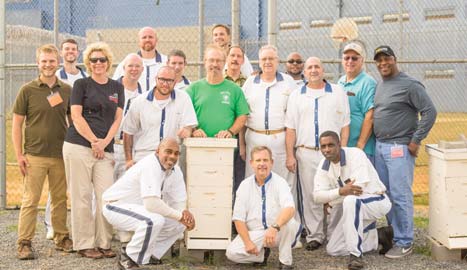
Dooly State.
The gag continues: When invited to the Boise Idaho, Treasure Valley Beekeepers three-day weekend event, the informal gathering of members began to “toot” first one, then another during the “welcome” dinner in which Jen was present. Jen, only having just met them, and not knowing that they are just your usual, fun loving group of beekeeper crazies, didn’t know they had gone out and purchased some whoopee cushions. They eventually fessed up and the busy weekend of one bee activity after another got off on the right foot. They loved Jen and she loved them. They learned a lot and they entertained her in great fashion. Check out her December 2018 Bee Culture interview of the club; one recommendation, if you too have a bee weekend and you want the perfect speaker – think, Jennifer Berry. And have someone bring a whoopee cushion – 3rd times a charm!.
Jen wrote in the 2018 interview issue (she interviewed nine individuals of the Treasure Valley Beekeepers): “The December issue is one of my favorite articles to write, not only because I get to feature someone special, but also because I get to know this person even better.” I certainly second that sentiment. I hope you too have the opportunity to get to know Jennifer Berry better!
Jen keep up the great work and good luck with the PhD.






